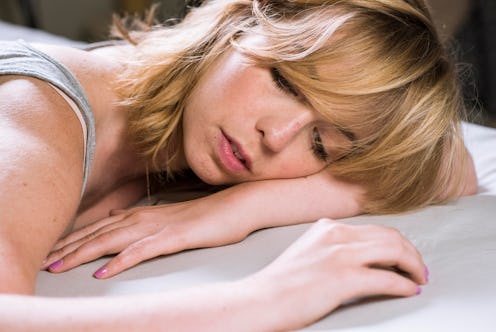Life
5 Things That Happen To Your Brain When You Have A Hangover

To some people, part of going out with friends is drinking alcohol. Even though it may be fun at the time, especially since that new speakeasy serves amazing, one-of-a-kind drinks, the aftermath may not be as fun. Yep, the hangover: You’re exhausted, feel as though your head will explode since it hurts so much, and you may be nauseous or vomiting, too, among other symptoms. But something you may not think about is what happens to your brain when you’re hungover.
“The effects of alcohol are more significant than some realize — it impacts brain function and neurochemistry,” Dr. Adam Lipson, a neurosurgeon at IGEA Brain & Spine, tells Bustle. “Frequent hangovers are a sign of alcoholism. In my world as a surgeon, one hangover is too much. Everyone has a different relationship with this issue, but frequent hangovers should be considered a red flag.”
While you may not think a post-drinking headache is a big deal, a lot more is going on inside your head after drinking alcohol than you may think. Below, you’ll find some key things that happen to your brain when you have a hangover, according to experts and studies.
1Increased Levels of Anxiety
You may already suffer from anxiety, but when you add alcohol to the equation, your anxiety might get worse. You may know of people, or even yourself, who have a glass of wine “to relax,” but this effect is false, even though it may seem relaxing at the time. According to Healthline, you may feel relaxed as a result of your blood alcohol content (BAC). A rise in BAC levels may make you feel better — temporarily. However, as the BAC levels decrease, that’s when feelings of depression and anxiety occur.
2Increased Feelings Of Depression
Do you ever feel sad after drinking alcohol? You probably hear people say it’s a depressant, and there’s truth to it. “Alcohol is a depressant, so it can make you feel sad either when consuming it, or afterwards when you have a hangover,” Dr. Isha Gupta, a neurologist at IGEA Brain & Spine, tells Bustle.
3Decreased Motor Skills
While you may be aware that your motor skills decrease as you consume alcohol — hence, no drinking and driving — they also can during the hangover stage since you may still have alcohol in your system. According to the National Institute on Alcohol Abuse and Alcoholism, the cerebellum, aka an area of the brain that controls coordinating your movements and possibly certain forms of learning, is most frequently damaged when it comes to chronic alcohol consumption.
4Inconsistent Sleep
If you wonder why you cannot get a good night’s sleep after a night of drinking, there’s good reason. Sure, maybe you initially passed out right out when you got home, but then you may find yourself waking up several times during the night. And, of course, poor sleep can lead to a downward spiral of decreased cognitive functioning, poor work performance, and just feeling out of it the day after drinking or for a few days after drinking. “Since alcohol is a depressant, as the alcohol leaves your system you may have difficulty sleeping, since its depressant effects are wearing off,” Dr. Gupta says.
5Delusions
“There is something known as alcohol-related psychosis, which involves hallucinations or delusions during a period of alcohol withdrawal, which can occur during a hangover,” Dr. Gupta says. Strange, right? According to the National Center for Biotechnology Information, which is part of the United States National Library of Medicine, a branch of the National Institutes of Health, symptoms of psychosis can occur during or after heavy alcohol intake. “Clinically, alcohol-induced psychosis is similar to schizophrenia but has been found to be a unique and independent condition,” they state. “It is characterized by hallucinations, paranoia, and fear.”
After reading the above, you may also wonder how much alcohol is too much. “Everyone has a different and individual relationship with alcohol,” Dr. Lipson says. “It is suggested [by the Dietary Guidelines for Americans] that women consume no more than one alcoholic beverage per day and no more than two for men. Generally speaking, no more than four to six drinks should be consumed per week.”
There you have it — if you' ever feel "off" after a night of drinking, now you know there's a lot more than just a headache going on in your head when you're hungover.